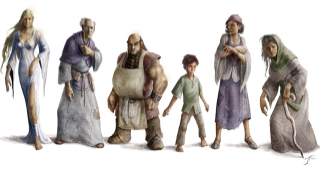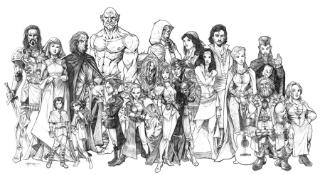Character Design
Character design can be one of the most intimidating aspects
of playing in the game. But in truth, with a little
forethought and some creativity, it's not that hard and can be
a very rewarding experience.
Character design is totally up to the players, so be prepared
to play what you create. Decide what you would like to
experience in the game then give your character some history,
personality and abilities that will allow you to explore that
experience. There is no such thing as too much detail in this
area. The more detail you create about your character the
better you will know how to react to any given situation while
role-playing.
The Core Concept
Probably one of the first things you will want to do is
decide in very general terms, what kind of character you want
to play. Will you play a greedy merchant, an aloof mage, a
simple farmer, or a inept monk?
This is usually based on what profession they want to be and
what obvious traits that character will have. This is often
how most people will see your character at first glance (first
impression if you will) and is not always who they truly are.
Someone who is shy for example could very well be a vicious
killer that has learned that being quiet and
non-confrontational in public causes people to drop their
guard. A loud, obnoxious barbarian is not always a brainless
brute
Dont know where to start? Here are some rough character ideas
to mix and match.
Traits: crusty, conniving, noble, loyal, inept, lusty,
manipulating, greedy, light-fingered, shallow, untrustworthy,
wise-cracking
Professions: mercenary, treasure hunter, warrior, mage,
healer, peasant, royalty, barrister, historian, cleric, monk,
merchant
Abilities
Next, think about the abilities that your character has.
These define how your character can do the things that he
does. If he's a fighter, think about what abilities he has
that enable him to be a fighter. If you've designed a wizard,
think about your spells and any other special abilities that
you might have. If you're playing a merchant, what are you
going to sell and how much money do you have?
Abilities and profession do not have to match. For example,
someone who plays a warrior doesn't need to be good with a
sword, but they might think that they are. Wizards don't need
to be proficient at what they do. Bumbling wizards are
perfectly acceptable. Others may have abilities that are
irrelevant to their profession. For example, a peasant may
have latent magical powers and be able to see the dead. Or
maybe a merchant also knows a couple of spells.
Details
People in past games have made all manner of characters
ranging from peasants to kings. All characters have a core
concept but what makes a character truly interesting is the
background you give to them. How a character acts, talks,
walks, and reacts to things around him is very important for
effective role-playing. Interacting with other characters is
essential and requires that you think about who your character
is before you get to the game.
So, how do you add details and depth to your character? Some
of the questions you should ask yourself about your character
are:
- What are his goals?
- Does she have any hang ups? (Like really hating the smell of flowers)
- How does he react to other races? (Does he have the normal outlook on things or an unnatural hatred for elves?)
- How did she become who she is? (Why did they become a mage, fighter, farmer, beggar?)
- What is the history of your character?
Background
Just as the game has a storyline so should your character.
This is never a requirement but many players find that by
creating a good storyline they are easily able to add details
to who their character is and how she would react in almost
any situation. It also helps us, the game designers, weave you
into the storyline of the game which will only serve to enrich
the game for you. You don't need to write a novel here (in
fact we may not have time to read it if you do) but a short
story of less than 5 pages should give you a solid grasp on
what your character would do, and how they would react, in
most situations.
Again this is not required but strongly encouraged.





